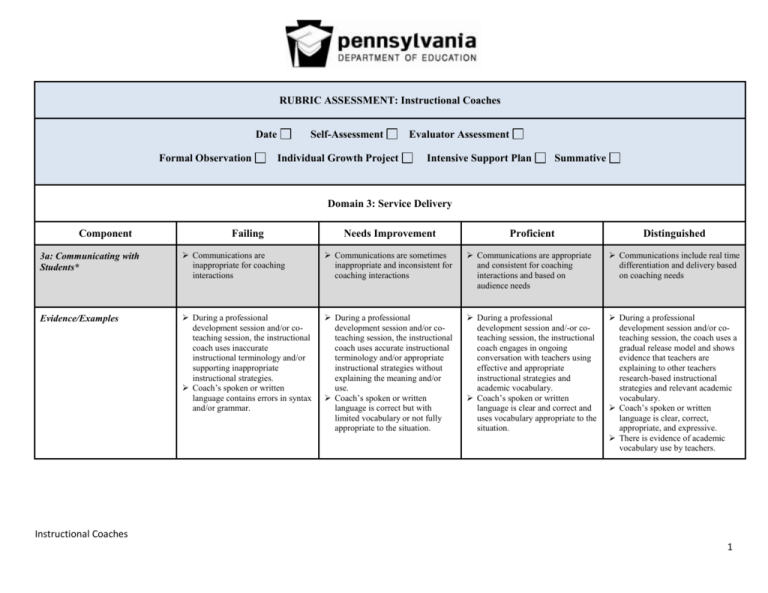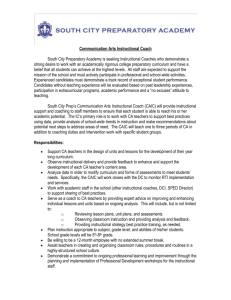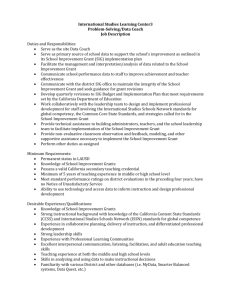Domain 3 Examples REV
advertisement

RUBRIC ASSESSMENT: Instructional Coaches Date Formal Observation Self-Assessment Individual Growth Project Evaluator Assessment Intensive Support Plan Summative Domain 3: Service Delivery Component Failing Needs Improvement Proficient Distinguished 3a: Communicating with Students* Communications are inappropriate for coaching interactions Communications are sometimes inappropriate and inconsistent for coaching interactions Communications are appropriate and consistent for coaching interactions and based on audience needs Communications include real time differentiation and delivery based on coaching needs Evidence/Examples During a professional development session and/or coteaching session, the instructional coach uses inaccurate instructional terminology and/or supporting inappropriate instructional strategies. Coach’s spoken or written language contains errors in syntax and/or grammar. During a professional development session and/or coteaching session, the instructional coach uses accurate instructional terminology and/or appropriate instructional strategies without explaining the meaning and/or use. Coach’s spoken or written language is correct but with limited vocabulary or not fully appropriate to the situation. During a professional development session and/-or coteaching session, the instructional coach engages in ongoing conversation with teachers using effective and appropriate instructional strategies and academic vocabulary. Coach’s spoken or written language is clear and correct and uses vocabulary appropriate to the situation. During a professional development session and/or coteaching session, the coach uses a gradual release model and shows evidence that teachers are explaining to other teachers research-based instructional strategies and relevant academic vocabulary. Coach’s spoken or written language is clear, correct, appropriate, and expressive. There is evidence of academic vocabulary use by teachers. Instructional Coaches 1 Component Failing Needs Improvement 3b: Using Questioning and Discussion Techniques The instructional coach asks lowlevel or inappropriate questions, eliciting limited participation and recitation instead of a discussion. The instructional coach uses some effective questioning and discussion techniques and the audience is inconsistently engaged in discussions. The instructional coach uses effective questioning and discussion techniques to probe more deeply and encourage metacognition. The instructional coach facilitates a discussion using proven and effective questioning and discussion techniques and invites audience to deepen the reflective learning through metacognitive discourse. Evidence/Examples The instructional coach only models the use of close ended questions as a primary strategy and does not use clarifying, probing, or reflective questions. The instructional coach’s questions do not promote student thinking. The instructional coach infrequently uses clarifying, probing, or reflective questions. The instructional coach’s questions occasionally promote student thinking and may only have a single answer. The instructional coach frequently poses clarifying, probing, or reflective questions that stimulate teacher participation and collegial sharing. The instructional coach models questioning and discussion techniques to promote students’ higher order thinking. Teachers and the instructional coach use clarifying, probing, or reflective questions during their interactions to guide inquiry about teaching practice. Over time, the students initiate higher level questioning and discussion techniques as modeled by the instructional coach. Proficient Distinguished Component Failing Needs Improvement Proficient Distinguished 3c: Engaging Students* in Learning Activities, assignments, and materials are inappropriate for instructional outcomes or learner’s current level of understanding. The learning session has no structure or is poorly paced. Activities, assignments, and materials are somewhat appropriate for the instructional outcomes or learner’s current level of understanding. The learning session has some structure but not consistently maintained. Activities, assignments, and materials are consistently appropriate for the instructional outcomes and learner’s current level of understanding. Learners are engaged and the structure for learning session is coherent and appropriate to the audience. Throughout the lesson, learners are engaged and make contributions to the activities, materials, and assignments. The learning session is differentiated to meet the needs of all learners. Learners initiate self-reflection and course correction where necessary. Evidence/Examples Instructional coach lectures for 45 minutes during a professional development activity using Instructional coach provides limited opportunities for participation and active Instructional coach provides frequent opportunities for participation and active The instructional coach provides ongoing opportunities for teachers to collaborate and/co-facilitate Instructional Coaches 2 generic strategies and resources. The instructional coach provides whole or small group professional development, but does not work individually with teachers. Component Failing engagement using strategies and resources that are relative to content but inconsistent with teacher needs. The instructional coach does not consistently collaborate and reflect with teachers before and after a classroom visit. Needs Improvement engagement using strategies and resources relative to content and consistent with teacher needs. The instructional coach collaborates and reflects with teachers before and after classroom visits. Proficient sustained professional nearing that extends past the professional learning session. The teacher initiates the before, during and after cycle with the coach and other teachers to plan for and reflect on lessons. Teachers initiate the ongoing collaboration with the instructional coach before, during and after classroom visits. Distinguished 3d: Using Assessment in Instruction The instructional coach does not share assessment tools when working with teachers and provides little or no feedback to learners during or after instruction. The instructional coach shares limited assessment tools when multiple options are available and more appropriate. Feedback is inconsistent. The instructional coach shares multiple, appropriate assessment measures. Feedback is consistent and timely. The instructional coach facilitates and collaborates with teachers to develop common formative assessments and summative assessments. Feedback is consistent and timely. Evidence/Examples The coach does not discuss the use of assessment to drive instruction. The coach and teacher do not use assessments to drive classroom practice. Feedback to students is non-existent The coach does not use a tool to evaluate the effectiveness of a PD session. Teacher and instructional coach sporadically use formative assessments to analyze student learning. The coach and teacher use assessments inconsistently and ineffectively to drive classroom practice. Feedback to student is limited. The coach uses a tool for teachers to evaluate the effectiveness of a PD session, but inconsistently follows up. Teacher and instructional coach develop formative assessments to consistently analyze student learning and communicate and share outcomes with students. The coach initiates dialogue in the after session with the teacher to reflect on effectiveness of the assessment to drive classroom practice. Students are aware of how assessments are used to evaluate their work. The coach uses a writing prompt at the end of a PD session to evaluate the effectiveness of the PD session and uses the results to plan next steps. Instructional coach supports teacher in developing strategies that encourage student selfassessment. In collaboration with the instructional coach, the teacher uses information from the assessment, e.g., exit tickets to assess, plan and create lessons that move student learning forward. Students own the assessment results. The coach plans differentiated support for teachers based on data from PD sessions. Instructional Coaches 3 Component Failing Needs Improvement Proficient Distinguished 3e: Demonstrating Flexibility and Responsiveness The instructional coach focuses on an instructional design without alignment to adult learner needs or outcomes. The instructional coach is invested in the success of adult learners; however, adjustments to instructional design are inconsistently made with partially successful results. The instructional coach promotes the progress of all adult learners, making adequate adjustments to instructional design. The instructional coach accommodates adult questions, needs, and interests. The instructional coach promotes the successful progress of all adult learners, making seamless adjustments to instructional design. The instructional coach accommodates learner questions and needs, using an extensive repertoire of instructional strategies and tools. Evidence/Examples Instructional coach adheres to his/her plan, in spite of evidence of its inadequacy, inappropriateness, or irrelevancy. Instructional coach spends much of the time in the coaching office and responds only when teachers approach with specific needs. Instructional coach makes modest adjustments resulting from teacher interactions when confronted with evidence of the need for change. Instructional coach works with the teachers but does not align the coaching work with the individual or school wide needs. The instructional coach interacts regularly with teachers and elicits suggestions via a needs assessment and collaborative inquiry about teacher needs and plans accordingly for one-on-one and small group work. Instructional coach is cognizant of the needs of the building, provides opportunities to address those needs, and offers a variety of instructional strategies to address those needs. Teachers initiate collaborative conversations with instructional coach who welcomes, extends, and adapts strategies to meet the changing needs of teachers via ongoing conversations about teacher needs and providing differentiated support in one-one and small group work. Using core standards, the teachers and instructional coach work together to identify future needs and build a professional development plan to address those needs. Instructional Coaches 4







